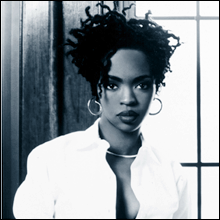![[Sidebar]](/standard/image/sidebar.gif)
![[Music Reviews]](/standard/image/headers/music_reviews_header.gif)
| clubs by night | club directory | bands in town | concerts | hot links | reviews & features |
Pie charts
Slicing up the Grammys
by Matt Ashare
Kiss
There's a big customized pie-chart diagram -- cleverly designed to look like a CD -- in the latest issue of Rolling Stone that boils the last calendar year in music down to the sort of impersonal raw data that used to make those Ross Perot infomercials such a hoot. In general, it tells a happy story for the record industry in '98, namely that for the first time in two years CD sales experienced a marked upswing. But if you're in a rock band, particularly one destined to be filed under "alternative," the numbers don't look good at all. Unless, of course, like the Goo Goo Dolls you've got some clout in Hollywood. Thanks to blockbuster releases like Titanic and the Goo-powered City of Angels, soundtrack sales were up 36 percent. The six percent growth of sales in the "alternative" market did outpace country's measly three percent bump, but that was modest indeed compared to the 32 percent and 14 percent contributions of rap and R&B respectively to the sales boom. And if something called just plain "rock" still exists, it apparently wasn't deemed significant enough to include in this particular diagram.In the same issue of Stone -- actually on the next page -- you can find Everclear frontman Art Alexakis, an alterna-rock guy, shaking off the bad news using the same sort of vague justification that's kept the Senate and House Republicans going in the face of bad numbers: "American people, the mainstream person, likes rock & roll songs, and that's not going away." I'm not sure which "mainstream" Alexakis is referring to -- the one that accidentally made Celine Dion and Garth Brooks two of '99's top-selling artists, or the one that unwittingly helped Lauryn Hill post one of the most commercially successful debut albums by a female artist ever. But it's a group that won't find much solace in the way of "rock & roll songs" on either of the two 1999 Grammy Nominees CDs that Elektra released earlier this week in anticipation of the February 24 Grammy Awards.
Lauryn Hill
This year, hip-hop or rap was so big it warranted its own separate but equal CD, which probably makes good marketing sense but still begs the question as to why this predominantly African-American-associated genre continues to be segregated from the larger realm of "pop" even as its sound becomes more and more embedded in the lexicon of contemporary pop. The rock nominees, however, apparently weren't worth compiling, though you will find the Goo Goo Dolls' guitar-driven "Iris," Eric Clapton's "My Father's Eyes," and new folky rocker Shawn Mullins's "Lullaby" mixed in with tracks by Celine, Brandy and Monica, Lauryn Hill, Madonna, Natalie Imbruglia, and Shania Twain on the non-hip-hop CD. (Grammy's most prestigious category, Record of the Year, similarly reflects of the dominance of women artists in 1998: the Goos are the lone boys on the list.)As for what is known as the "rock field" in Grammy parlance, boys with guitars have given way to middle-aged men with guitars, song doctors, and in some cases face paint. John Fogerty scored Best Male Rock Vocal Performance and Best Rock Album nominations on the basis of a live CD; John Hiatt's "Have a Little Faith in Me" might not have been good enough for a Grammy nomination when he first recorded it 12 years ago, but the new version of it he did for a greatest-hits CD last year earned him a Best Male Rock Vocal nod this time around. And, having been shunned by NARAS back in the '70s, Kiss and Jimmy Page and Robert Plant will both finally have a shot at taking home a Grammy in the Best Hard Rock Performance category, particularly since they won't be up against Aerosmith, who have softened enough over the years that their "Pink" can now join a Bowie cover(!) (Wallflowers' "Heroes"), a song the courts have deemed a Stones cover (the Verve's "Bittersweet Symphony"), an Elvis Costello sound-alike (Fastball's "The Way"), and Hole's "Celebrity Skin" in the running for Best Rock Performance by a Duo or Group with Vocal. (My money's on Aerosmith, but my rock-and-roll heart's with Courtney.)
Unlike the American Music Awards, which are based largely on sales figures and airplay, the Grammys are awarded by the "music professionals" who make up NARAS (National Academy of Recording Arts and Sciences), and as such they've always been a popularity contest ruled by politics. Indeed, it takes a definition as Clintonian as "For a new artist who releases, during the eligibility year, the first recording which establishes the public identity of that artist" to get Lauryn Hill's name on the Best New Artist list, and never mind that she sold enough albums fronting the Fugees only a couple of years ago to establish something quite close to a "public identity." And like most political parties, Grammy tends to be rather conservative. So whether or not "rock" earns a place on future pie charts, rockers like Alexakis will be welcome for years to come. This time, by the way, his "El Distorto de Melódica" is up for Best Rock Instrumental Performance.
| home page | what's new | search | about the phoenix | feedback |
Copyright © 1999 The Phoenix Media/Communications Group. All rights reserved.

